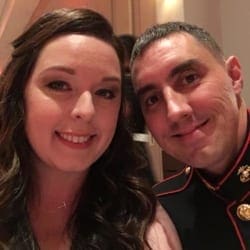We can’t take care of others until we take care of ourselves, so don’t try and do it all alone.
What are you most excited to do as a Dole Caregiver Fellow?
I am most excited about sharing my story with other caregivers who may not realize how significant of a role they play in their veteran’s care. As a fellow, I hope that sharing my story, and that of other caregivers, will bring more awareness to our struggles and everyday challenges, and in turn prompt change and progress for future caregivers.
At what moment did you realize you were a military caregiver?
It wasn’t until I was sitting in front of a medical specialist with my husband while advocating for a change in his treatment, and having the doctor question my judgement, that I really felt like a caregiver. I knew at that moment that making sure my husband received proper treatment and care was now my job, and that I would do whatever it took to see it through.
What does being a military or veteran caregiver mean to you?
Being a veteran caregiver means playing a vital role in the day to day life of my husband. The new responsibilities I have as a caregiver allow him to focus on his well being, knowing I am there to help manage medication, medical appointments, financial requirements, and any other challenges that may come our way. We are a team.

My Story
Brandy Wrenn knew that her husband Richard’s retirement from the Marine Corps after 16 years of service would be a difficult transition for him and the whole family. What she couldn’t predict were the challenges the transition would bring.
In 2004, Richard sustained wounds from an improvised explosive device blast while serving in Iraq and was awarded a Purple Heart. After the incident, he dealt with hearing loss, migraines, and sleep issues that seemed to become worse with every passing year. In 2016, a new injury and the multiple surgeries that followed required him to perform a less physical role as a Marine, altering his career path. In 2018, Richard retired from the Marine Corps, just two weeks after Hurricane Florence ripped open their home in North Carolina.
The stress and fast pace of the house repairs kept Richard from dwelling on the loss of his daily role as part of the Marine Corps, but Brandy knew it was only a matter of time before that reality set in. As Richard’s physical constraints played with his mental health, and he received a diagnosis of post traumatic stress disorder (PTSD), Brandy’s role as a supportive wife took on the look and feel of a caregiver. She began to manage Richard’s medication, advocate for him at his medical appointments, fill out paperwork at the VA, manage the home finances, and be Richard’s non-stop support system.
Beyond caring for four of their five children who still live at home, Brandy is a social worker and a full-time graduate student. Their oldest daughter, a social worker who plans to work with military veterans after graduate school, is married to a Marine Corps Sergeant and is currently stationed 20 hours away in Texas. In addition to caring for her veteran husband, Brandy also does her part to look after her father, a disabled U.S. Navy veteran from the Vietnam-era, which is challenging because of the three-hour distance between them.
Brandy knows that people don’t physically see the damage and the toll Richard’s experiences have had on him. She still struggles with making people aware of his challenges and what she faces as a caregiver, as Richard is a private person. However, they both agree that sharing their story on a public platform could encourage other caregivers with similar stories to open up, reach out, and receive help by acknowledging their own struggles.









